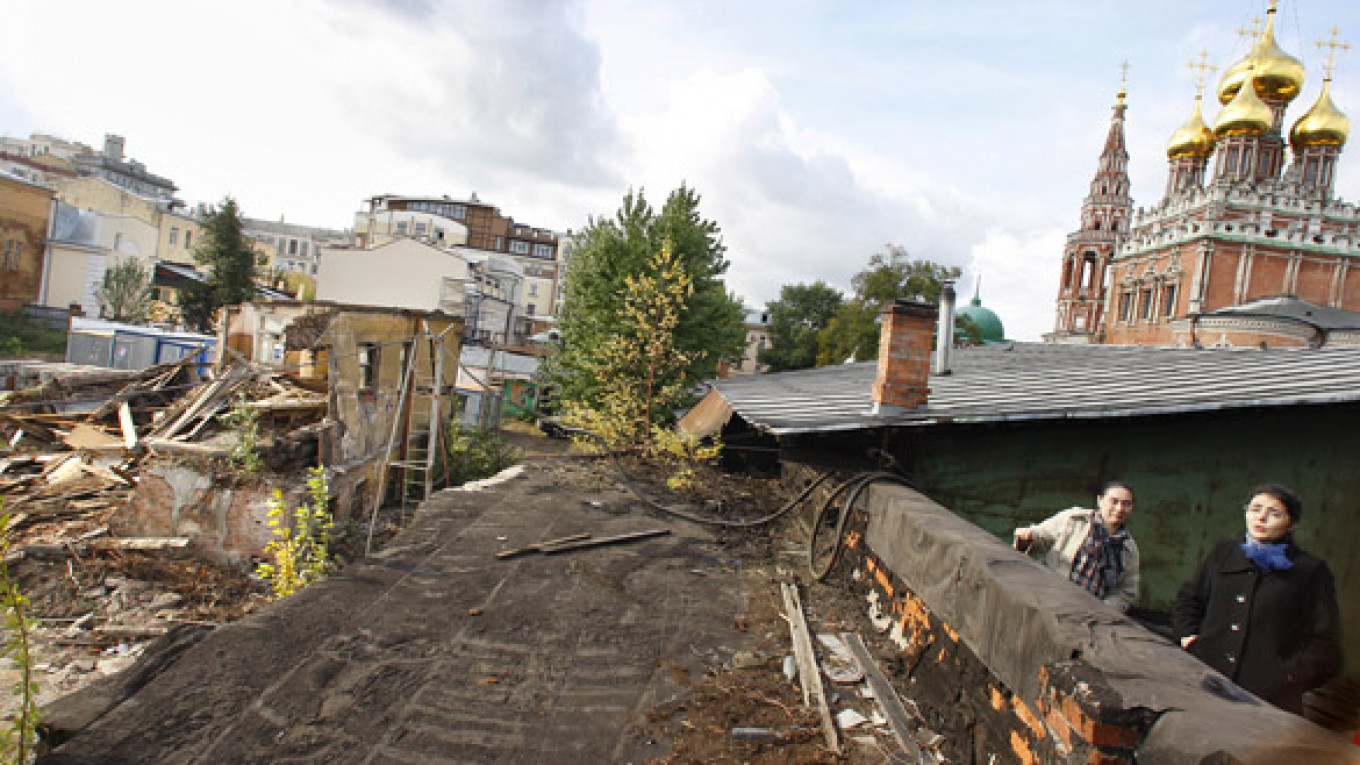Builders knocked down a 19th-century building on a protected piece of land in central Moscow on Thursday to make way for an elite apartment complex, the latest casualty in a construction drive that preservationists say is destroying the city’s cultural heritage.
What makes Thursday’s demolition of the two-story Deacon’s House near Ulitsa Bolshaya Ordynka remarkable is that Mayor Yury Luzhkov’s City Hall had promised to protect the site and the razing occurred on the eve of City Duma elections.
Workers with Torgproduktservis, which controls the land where Deacon’s House stood, dismantled the building on Kadashevsky Tupik to clear the area for the construction of the elite Five Capitals complex, which will contain 36,000 square meters of apartments.
“The destruction of the building was a big surprise for us. The landowners had promised that they would not touch Deacon’s House, and we did not expect that they would break the promise,” said Lidia Shestakova, who works in a museum located in the nearby Church of the Resurrection in Kadashi.
Deacon’s House was part of an architectural ensemble that included the church, which was built in 1695 and itself may be at risk from the new construction.
A Moscow merchant gave Deacon’s House to the Church of the Resurrection in Kadashi shortly after it was built in the late 1800s, and the entire area is a protected historical zone, said Natalya Samover, a preservationist with Arkhnadzor, a group seeking to protect old buildings in central Moscow.
“This building [Deacon’s House] and the nearby Chamber of Olenevy are of great historical value,” Samover said. “They are part of the authentic surroundings of the church that were built at the end of the 19th century.”
Still, City Hall included Deacon’s House on a list of buildings to be knocked down when it authorized the Five Capitals complex in 2002, Samover said.
Construction workers began dismantling Deacon’s House in 2003, but the work was suspended amid opposition, and the building stood half-demolished until Thursday.
“We are sure that they left the house in this state intentionally. The ruins could prove that the building had no value and there was nothing to save here,” Samover said.
Church representatives also put up a fight for Deacon’s House.
“We have been in talks with Torgproduktservis for a long time. They even offered us money and asked us not to protest against the construction of the apartment complex,” Shestakova said.
Torgproduktservis officials were unavailable for comment Thursday evening. The director of Five Capitals’ main contractor, Felix Batkin, refused to discuss the project, saying he does not talk to reporters.
The construction of Five Capitals poses a danger for the foundation of the church, which is built on piles. “Any underground construction near the church is forbidden, but as far as we know the new apartment complex is supposed to have a large underground parking for 190 cars,” Shestakova said.
Church representatives complained to the Prosecutor General’s Office but were told to turn to City Hall’s cultural heritage committee, she said. The officials also wrote to Luzhkov but received no reply, she said.
Moscow’s chief architect, Alexander Kuzmin, previously promised to keep builders off the territory.
“I’ll tell you one thing: you can consider that there will be no attempts by investors to come on to the territory of this landmark,” Kuzmin said in undated comments posted on the web site of the city district where the church is located. “This is a major issue in Moscow.”
The cultural heritage committee suspended construction but on Aug. 5 gave its approval for the project to go ahead.
“We delivered two petitions asking to protect Deacon’s House as a valuable historical object. The last one was sent this summer. But the cultural heritage committee declined to confirm the historical importance of the building, saying it has no special value,” Samover said.
Kuzmin and the cultural heritage committee were not immediately available for comment.
Luzhkov has repeatedly declared his support for Moscow’s architectural heritage, but preservationists say the city is gradually losing its historical face. Among the many examples, the legendary Voyentorg department store was demolished in 2004 in favor of a new trading center, and the Stalin-era Moskva hotel was torn down and is now being replaced with a modern replica. Another landmark that City Hall plans to rebuild is Proviantskiye Sklady, originally constructed in the 1830s as a food storage facility for the tsarist military. The city, which wants to build the Moscow History Museum on the site, drew up plans to add a fourth building to the existing three and combine them under a roof of glass, but a committee in the International Council of Museums rejected the proposal this week, RIA-Novosti reported.
Incidentally, Luzhkov’s wife, Yelena Baturina, is the head of real estate developer Inteko and is estimated by Forbes magazine to be the wealthiest woman in Russia.
The mayor tops United Russia’s ticket in elections for the City Duma on Sunday.
Yevgeny Bunimovich, a Yabloko deputy in the outgoing City Duma, said City Hall needed to do more to protect Moscow’s heritage. “This is the real Moscow. I myself was born in a similar small, half-wooden house,” he told The Moscow Times.
“Unfortunately, actions and the law do not match in the case of the church in Kadashi,” he said, adding, “Our law is not bad, but it needs to be amended to prevent such problems.”


